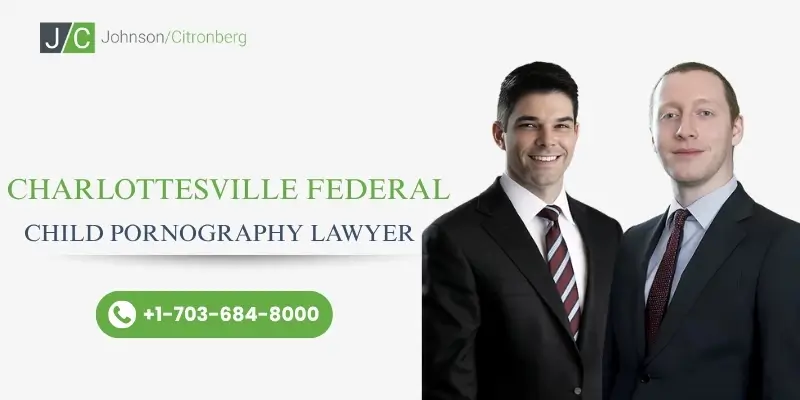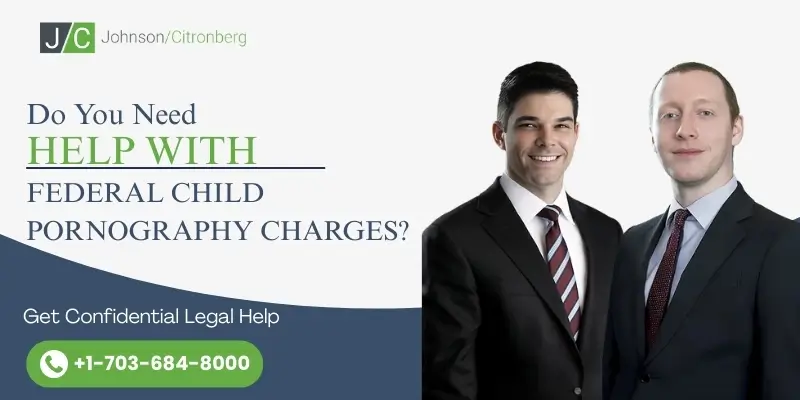Charlottesville Federal Child Pornography Lawyer
Federal Child Pornography Attorney in Charlottesville
Criminal allegations can turn a person’s life upside down in a moment. When those allegations involve offenses like child pornography, an accusation is enough to have a significant impact. If you are facing similar charges, a skilled Charlottesville federal child pornography lawyer at Johnson/Citronberg, PLLC, can help you minimize the damage to your life and reputation and aggressively defend you and your rights.
The trusted legal team at Johnson/Citronberg, PLLC, has a solid track record of successful outcomes for clients facing federal charges. Our nationally recognized lawyers have extensive experience with federal child pornography laws, are well-versed in federal criminal legal defense strategies, and have access to top investigators and forensic experts for the highest possible chance of a positive outcome for your case. If federal agents have seized your devices or opened an investigation, knowing how to protect your privacy and reputation during a federal child pornography investigation can make a crucial difference in limiting exposure and preserving your rights.

Federal Child Pornography Penalties
The possession, receipt, distribution, or production of child pornography is illegal under Virginia state law and US federal law. Child pornography is defined in legal settings as a visual depiction that involves a person under 18 engaged in conduct considered sexually explicit. Depictions can include a photograph, a video, and images and videos generated by computers, simulations, animations, and altered depictions.
In general, production charges are considered the most severe and carry the harshest penalties, up to 30 years in prison. However, production also includes proving intent, which can make charges more difficult to prove.
Possession, receipt, and distribution are often called non-production charges, and penalties include up to 20 years in prison. Possession just means that a person has the depiction. Receipt means they received it from another person, and distribution means sending it to another person. Of the non-production charges, distribution is usually considered the most severe.
The most recent information shows that 45.8% of child pornography sentences were for possession. Another 41.3% were sentenced for distribution, and 11.1% were sentenced for receipt. Prison time was involved for 99.5% of sentences, with an average of 115 months.
These penalties are shaped by the federal child pornography sentencing framework, which outlines how courts determine imprisonment ranges and financial penalties in these cases.
Improve Your Chances of a Favorable Outcome in Your Case
The most effective way to improve your chances of a favorable outcome in your case is to hire an experienced federal child pornography lawyer. The attorneys at Johnson/Citronberg, PLLC, have a deep understanding of federal laws and court procedures, a strong track record of successes in federal cases, and professional resources and relationships to create a fierce legal defense for you.
For example, while having an illegal file on your computer or other device can be enough to charge you with a crime, working with an independent expert in computer forensics can often show that an individual did not have knowledge of the file’s existence. Understanding how a computer forensics defense expert can impact your case can make all the difference in how digital evidence is analyzed and presented in court.
Federal Child Pornography Defense Strategies
Each case has its own unique facts and details, and as such, a strong defense must be tailored to the individual case and defendant. However, there are many common strategies that your attorney can use when developing your legal defense. Some of these include:
- Entrapment by police, meaning a law enforcement officer induced a crime that would not have been committed without their persuasion
- Illegal search and seizure, which means that proper legal procedures were not followed in gathering the evidence against you. As such, any illegally gathered evidence may not be admissible in court.
- Possession by accident is when a user accidentally downloads child pornography without their consent. This can be related to viruses or other malware, hackers, or other means.
- The images do not include a minor. If it can be proved that the people in the materials are not under 18, then it may not be considered child pornography.
- Someone else had access to the defendant’s device and is responsible for the illegal files.
FAQs
What Rights Does a Person Have if Their Electronic Devices Are Seized?
If a person’s electronic devices are seized by law enforcement officials, there generally has to be probable cause to take such actions. In cases where there is no probable cause and there was no search warrant, the person may be able to file a motion with the court to have their devices returned and any evidence on them suppressed. Your attorney can help you determine how the law applies to your particular case.
Is Intent Required to Be Convicted of a Federal Child Pornography Crime?
Intent is not always required to be convicted of a federal child pornography crime. In some cases, knowledge of illegal materials, combined with possession, receipt, or distribution, may be enough for a conviction. However, knowledge and intent can be difficult to prove beyond a reasonable doubt, and your attorney may be able to challenge evidence or collaborate with experts who can show a lack of knowledge or intent.
Can Someone Be Prosecuted Federally for Peer-to-Peer File Sharing?
Yes, someone can be prosecuted federally for peer-to-peer file sharing of videos or images that depict underage children in sexually explicit content. In some cases, someone can still be prosecuted for peer-to-peer file sharing of child pornography even if they are not aware of the content, such as when files are mislabeled or unknown. Further, this can count as distribution if others download materials you are sending, even if you haven’t viewed them.
What Should You Do Immediately After Being Contacted by Federal Investigators?
Immediately after being contacted by federal investigators, you should hire a Charlottesville federal criminal defense lawyer. Exercise your right to silence and stay calm. Do not consent to a search, and do not destroy or alter potential evidence. Your attorney can advise you on the next steps and how to protect your rights throughout the legal process as per the Virginia law. In addition, they can often handle communication with federal investigators.
Contact Your Charlottesville Federal Child Pornography Attorney Today
For more than 30 years, the award-winning federal criminal defense lawyers at Johnson/Citronberg, PLLC, have been committed to protecting and defending the rights of people in Charlottesville who are dealing with allegations of criminal offenses. We strive for excellence in legal representation in every single case we handle, and it shows in our high rate of favorable outcomes. Contact our offices today to discuss your case.



